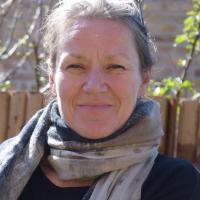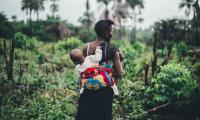Call for Danish leadership in linking security, climate action and sustainable development
The political basis for the Government of Denmark; “Responsibility for Denmark” highlights the climate and biodiversity crisis as the greatest challenge of our time, as does Denmark’s new Foreign and Security Policy Strategy. This Summer, extreme weather events all over the world have clearly demonstrated that climate change undermines sustainable development and already today seriously impact living conditions of current and future generations, life on the planet, and thus human security globally. We do not need scare stories that may lead to dis-empowerment and paralysis. We need visions and tools that unfold how security, climate action and sustainable development can be linked to create security in a broad sense, both in the Global North and the Global South..
The need for political leadership, visions, and investments in accelerated transformation
The annual ’Global Risk Report 2023’ from the World Economic Forum in Geneva on global leaders’ assessment of significant short- and long-term global risks supports the need for visions and transformative actions. Six of the ten biggest risks facing the world on the report’s top-10 list of global risks in the next decade are climate and environmental risks.
The global risks assessment is aligned with science, that for decades has been crystal clear. ‘Our world needs climate action on all fronts - everything, everywhere, all at once’, as the UN Secretary-General António Guterres expresses it, and as also requested by the international climate panel (IPCC), and highlighted in the latest UNEP Gap Emission 2022 report coordinated by CONCITO in collaboration with UNEP and UNFCCC.
We need sustainable, climate-resilient, net-zero and inclusive development both in the Global North and the Global South. We must integrate climate change management and sustainable development into all policies at all levels in a short time. The requirement also applies to foreign and security policy it its own rights and as the overall umbrella of Danish development policy and a new Africa Plan. We must invest as much in climate action and sustainable development as in defense and military capabilities. While defense spending has been increased to a minimum of 2 percent of GDP in many countries in light of Russia’s invasion of Ukraine, budget allocations for climate and sustainable development have been reduced. The need to integrate security, climate action and sustainable development and massively increase investment were key messages from international participants at the Conference on Climate Change and Sustainable Development on June 19, 2023, organized by CONCITO organized in collaboration with the Danish Ministry of Foreign Affairs.
Challenging global context
The transformation must take place in the current complex global post-COVID-19 and geopolitical context. Rule-based multilateral cooperation is weakened. Distrust between the Global South and the Global North is increasing. Instability and crises persist in several areas and are often interconnected. Rising debt levels and inflation generate a cost-of-living crisis that increases inequality in many countries which negatively affects social cohesion and increases societal polarization. Energy and food are used as weapons of war, which has transformed energy and food security as well as supply chains control and raw materials into security policy issues. And still there is a need to expand the concept of security even further beyond military and defense-related issues to enable the global community to adequately address the ten most serious global risks in the next decade.
Linking security, climate action and sustainable development is key addressing the challenges
Climate change and unsustainable development are increasingly drivers of vulnerability, instability and conflict from household level to international relations between countries and regions around the world. Climate change increases the frequency of drought periods and often results in too much or too little precipitation. The consequences vary depending on geography. In Denmark, Southern Europe and many places in the global south, reduced crop yields affect farmers’ income, consumer prices and even food security in some places. The poorest and most vulnerable are hit the hardest . Reduced volumes of water impact energy production and electricity prices in and between countries that depend on hydropower. Floods in Pakistan and fertile land in Iraq turning into desert force people to migrate. Both water scarcity - and floods - can pose an existential threat to local communities and entire nations. This makes water resource management an important foreign and security policy issue in relations between countries in many regions. Climate change is recognized as a critical factor in increasing poverty, general fragility and instability, and a driving force for migration, especially in the world’s poorest countries. According to the World Bank’s Groundswell report, by 2050, 216 million people across the world’s regions could be forced to move within their own countries. The report also concludes that immediate and coordinated action to reduce global emissions and support green, inclusive and resilient development could reduce the extent of climate-related migration by up to 80 percent.
The impact and management of climate change are linked to the question of how to ensure a just transition, including a fair distribution of costs and benefits of the transition to a low-carbon economy. As Frans Timmermans, former Vice President of the European Commission, has said: “If we don’t solve this problem, our children will fight wars over water and food.” Linking security, climate action and sustainable development is the key to addressing the greatest challenges of our time. The poorest and most vulnerable countries will need extraordinary support to ensure a just global transition and to manage inevitable losses and damages. The many parallel global crises create competition for political attention and resources. The situation is expected to affect the capacity to prepare, prevent and reduce risks, which can lead to erosion of both climate action, human development and future resilience. If we do not act, the costwill be unacceptable to human security and life on the planet.
Call for Danish leadership on visions and investment in broad based security
Denmark is uniquely positioned to act on the parallel and interlinked crisis. Taking lead on developing visions and investing in the linkages between security, climate action and sustainable development provides the Danish Government with a rare opportunity to demonstrate global leadership and become bridgebuilder between the Global North and the Global South. We propose to the Danish Government to:
- Allocates at least 2% of GDP to broad based security - linking security, climate and sustainable development as well as reconstruction of Ukraine. Denmark previously allocated 1.5% of GDP to development and environment in the 1990s in recognition of global needs.
- Develops a new and more broad-based security concept that clarifies what it means to link security, climate change and sustainable development in the implementation of Danish foreign and security policy, including in a future strategy for development cooperation and an upcoming Africa Plan.
- Considers establishing a cross-governmental structure to combine domestic and international dimensions of security and resilience, inspired by the Swedish cross-sectoral Myndigheten för Samhällsskydd och Beredskap (Myndigheten för Säkerhet och Beredskap) described in the Zilmer report,
- Promote a broader concept of security and related investments internationally through the upcoming Danish EU presidency, a Danish seat on the UN Security Council and Danish NATO membership.
- Supports and prioritizes research, innovation and technology transfer in climate change management, climate adaptation, CO2 reductions and resilience. Danish expertise in green technologies and sustainable solutions can be used to develop innovative solutions and share ‘best practices’ globally.
- As a global bridge builder, Denmark must engage in promoting international dialogue and rule-based cooperation between the Global North and the Global South to build trust and mutually beneficial partnerships for a fair and just transition.



